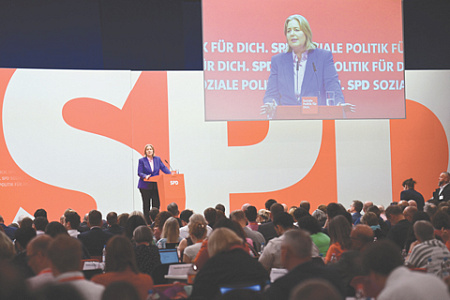
Germany’s Social Democratic Party (SPD) has concluded a critical three-day congress in Berlin, a somber gathering aimed at dissecting a historic electoral defeat and charting a course for survival. Faced with a catastrophic loss of support and a hemorrhaging membership that has shrunk the party by 40% since 1990, the delegates were tasked with electing new leadership and rethinking the very foundation of their political program. The party is in a state of profound crisis, having secured only half the votes of its conservative rivals, the CDU/CSU, in the recent snap federal elections.
An analysis by German media highlights a series of critical missteps that led to the party’s downfall. A key factor was the repeated necessity of compromising its core principles while in government coalitions, leaving major campaign promises unfulfilled and alienating its base. This pattern appears to be repeating, with new pledges to lower energy prices—currently five times higher than in the US and crippling German industry’s global competitiveness—deemed unlikely to be met. This, combined with what leaders admit is a failure to effectively communicate their message, has created a deep chasm of distrust with the electorate.
The crisis extends to the party’s leadership. The election of Lars Klingbeil and Bärbel Bas as new co-chairs has been met with skepticism, as both hold demanding ministerial positions, sparking concerns that their dual responsibilities will prevent them from effectively steering the party. Internal divisions were laid bare by Klingbeil’s lackluster re-election, securing only 65% of the vote, a stark contrast to the 95% support for Bas, signaling significant dissent within the party ranks.
The most profound schism, however, is ideological, revolving around the fundamental question of war and peace. A powerful faction led by Klingbeil and Defense Minister Boris Pistorius is pushing for a significant militarization of the country, citing a direct threat from Russia. This move directly clashes with the party’s historical identity and a vocal group of traditionalists, supported by the SPD’s youth wing, who recently issued a “Peace Manifesto.” This group fears the SPD is abandoning its legacy, a political vacuum they warn could be eagerly filled by rivals like the far-right AfD and Sahra Wagenknecht’s new alliance.
The ideological battle manifested in a heated debate over military conscription. The congress ultimately settled on a compromise: to expand the military on a voluntary basis, inspired by the Swedish model, aiming for 60,000 new soldiers and a 200,000-strong reserve. In a move seen by many as a sign of desperation, the party also adopted a controversial new strategy: passing a resolution to actively gather evidence to pursue a legal ban on the increasingly popular AfD, in the hopes of winning over its voters. This approach has been dismissed by their conservative CDU/CSU rivals, who advocate for confronting the AfD through political, not legal, means.
